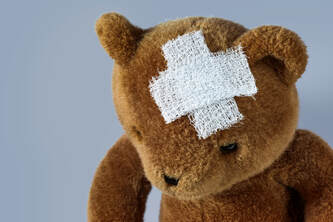
As much as we would like to wrap our children up in cotton wool we can't and bumps and bangs happen, often to their head. What would you do if your child fell and banged their head?
One key thing with head injuries is that it’s important to be able to determine between when you need to call 112, seek medical help or when you can care for them at home.
Any knock to the head is considered a head injury and classified as either mild, moderate or severe. Many head injuries are mild, and simply result in a small lump or bruise. If your child doesn't have signs of a serious head injury and remains alert, moves normally and responds to you, the injury is probably mild and usually doesn't need further testing. Mild head injuries can be managed at home, but if your child has received a moderate or severe injury to the head, they need to see a doctor.
Seek help immediately by calling an ambulance if:
- your child has had a head injury involving high speeds or heights greater than a metre, for example, car crashes, high-speed skateboard accidents or falling from playground equipment
- your child loses consciousness (passes out)
- your child seems unwell and vomits more than once after hitting their head.
Moderate to Severe Head Injury
Occasionally, a blow to the head may be severe enough to cause bleeding in or around the brain. With a severe head injury they may have:
- a deteriorating level of response
- loss of responsiveness
- leakage of blood or blood-stained watery fluid from the ear or nose
- unequal pupil size
- been knocked out and has not woken up
- difficulty staying awake or keeping their eyes open
- a fit (seizure or convulsion)
- problems with their vision
- bleeding from their ears or bruising behind their ears
- numbness or weakness in part of their body
- problems with walking, balance, understanding, speaking or writing
- be dazed or shocked
- has something stuck in their head, or a cut causing bleeding that is difficult to stop, or a large bump or bruise on their head
- Vomit more than once
- In younger children if they do not cry straight after the knock to the head
Clearly if your child is experiencing any of these severe symptoms call 112
If the head injury is bleeding heavily then apply pressure to the wound to stop or slow down the flow of blood and call 112.
Mild Head Injury
A mild head injury or concussion is when your child:
- may display altered level of consciousness at the time of the injury
- is now alert and interacts with you
- may have vomited, but only once
- may have bruises or cuts on their head
- is otherwise normal.
Care at home
If you do not need to go to hospital, you can usually look after your child at home. Don't leave your child alone for the first 48 hours!
To help recovery you can hold an ice pack (or a bag of frozen peas in a tea towel) to the injury regularly for short periods in the first few days to bring down any swelling.
Children and adolescents with concussion can take up to four weeks to recover, but most concussions will get better on their own over several days. Following a mild head injury, your child will need to get plenty of rest and sleep, particularly in the first 24 to 48 hours.
Your child may have a headache after a head injury. Give them paracetamol (not ibuprofen or aspirin) every six hours if needed to relieve pain.
There is no need to wake your child during the night unless you have been advised to do so by a doctor. Call an ambulance immediately if you have any difficulty waking your child.
Children who have had a head injury may develop symptoms at various times. Some of the symptoms may begin minutes or hours after the initial injury, while others may take days or weeks to show up.
If your child experiences any of the following symptoms, take them to the doctor or nearest hospital emergency department immediately:
- vomiting more than once
- bleeding or any discharge from the ear or nose
- fits/seizures/twitching/convulsions
- blurred or double vision
- poor coordination or clumsiness
- any new arm or leg weakness, or any existing weakness that gets worse or does not improve
- difficulty swallowing or coughing when eating or drinking
- sensitivity to noise
- slurred or unclear speech
- unusual or confused behaviour
- severe or persistent headache that is not relieved by paracetamol.
Can you let your baby or child go to sleep after a head injury?
YES - you can let them sleep if it is their normal time to sleep and they are not showing signs of serious head injury. If they seem unusually drowsy they may have a serious head injury and you should seek urgent medical attention.
Cognitive fatigue
Cognitive fatigue is a common problem that can happen after a head injury. When a child has cognitive fatigue, it means their brain has to work harder to concentrate on tasks it used to be able to do easily, for example watching TV, playing computer games, or having a long conversation. Cognitive fatigue is not related to a child’s intellectual capacity or physical energy levels. It can lead to behavioural problems, mood swings and educational difficulties. Your child may experience some or all of the following symptoms of cognitive fatigue:
- slowness when thinking, understanding and responding to questions or commands
- problems concentrating
- difficulties with memory
- difficulty thinking of the right words to say
- being more demanding than usual, and become easily frustrated
- being more fearful and anxious
- changed sleep patterns
- mood swings and irritability
Children experiencing cognitive fatigue should have complete rest – for their brain and body. This means no watching TV or playing on mobile electronic devices. Allow your child to gradually return to reading and other activities that require periods of greater concentration or thinking.
Key points to remember!
- Head injuries can be mild, moderate or severe
- Call an ambulance if your child has had a head injury involving high speeds or heights, or if after a knock to the head they lose consciousness or vomit more than once
- Your child may develop a number of different symptoms in the weeks after a head injury. Many of these require immediate medical attention
- Children with cognitive fatigue need complete rest to recover
For more information:
www.headway.org.uk/about-brain-injury/individuals/types-of-brain-injury/minor-head-injury-and-concussion/
Life First provides this information for guidance and it is not in any way a substitute for medical advice. Life First is not responsible or liable for any diagnosis made, or actions taken based on this information. It is strongly advised that you attend a First Aid course to understand what to do in a medical emergency.

